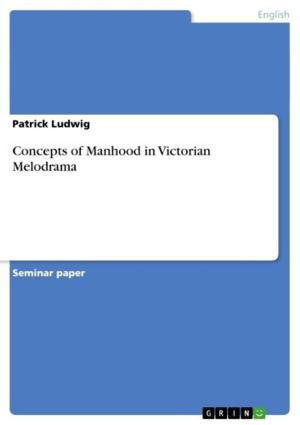Comparative Forms in British and American English
Nonfiction, Reference & Language, Study Aids, ESL, Foreign Languages| Author: | Alina Müller | ISBN: | 9783656059998 |
| Publisher: | GRIN Publishing | Publication: | November 18, 2011 |
| Imprint: | GRIN Publishing | Language: | English |
| Author: | Alina Müller |
| ISBN: | 9783656059998 |
| Publisher: | GRIN Publishing |
| Publication: | November 18, 2011 |
| Imprint: | GRIN Publishing |
| Language: | English |
Seminar paper from the year 2010 in the subject English - Grammar, Style, Working Technique, grade: 2,3, , language: English, abstract: First, the development of adjective forms of comparison should be clarified from the old English untill nowadays to explain the shifts of comparative structures in two national standards. The major change in the development of comparative formation across time span is the shift in American English from synthetic to analytic comparatives. The Standard English shows another pattern of development: the change from analytic to synthetic comparatives. Secondly, the major differences between British and American varieties in the usage of adjective forms should be explained. Focusing on the syllabic structure and frequency of adjectives, it will be shown that American English prefers more analytic comparatives than British English. Additionally, American variety uses fewer comparatives of both synthetic and analytic kind than British variety (Gonzalez-Diaz 2008, Hilpert 2007, Mondorf 2009, Kytö and Romaine 2000). Moreover, the investigation of different text types and complexity of those texts will help to explain the difference in usage of adjective comparison between two national standards. Finally, the development of American English in relation to British English will be outlined. In most cases, American English develops independently from British English in terms of adjective formation. American variety prefers innovations whereas British variety tends to preserve older features. This supports the idea that American English does not follow the steps of British English in terms of comparative structure change. So, to regard the American variety as an instance of colonial lag should be misleading. A better understanding of these issues will be presented in the following pages.
Seminar paper from the year 2010 in the subject English - Grammar, Style, Working Technique, grade: 2,3, , language: English, abstract: First, the development of adjective forms of comparison should be clarified from the old English untill nowadays to explain the shifts of comparative structures in two national standards. The major change in the development of comparative formation across time span is the shift in American English from synthetic to analytic comparatives. The Standard English shows another pattern of development: the change from analytic to synthetic comparatives. Secondly, the major differences between British and American varieties in the usage of adjective forms should be explained. Focusing on the syllabic structure and frequency of adjectives, it will be shown that American English prefers more analytic comparatives than British English. Additionally, American variety uses fewer comparatives of both synthetic and analytic kind than British variety (Gonzalez-Diaz 2008, Hilpert 2007, Mondorf 2009, Kytö and Romaine 2000). Moreover, the investigation of different text types and complexity of those texts will help to explain the difference in usage of adjective comparison between two national standards. Finally, the development of American English in relation to British English will be outlined. In most cases, American English develops independently from British English in terms of adjective formation. American variety prefers innovations whereas British variety tends to preserve older features. This supports the idea that American English does not follow the steps of British English in terms of comparative structure change. So, to regard the American variety as an instance of colonial lag should be misleading. A better understanding of these issues will be presented in the following pages.















